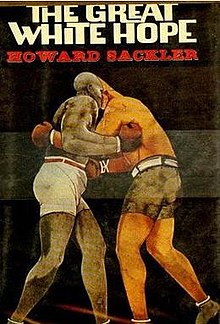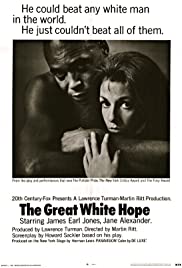The Great White Hope (1967)
The Great White Hope was adapted from a play of the same name written by Howard Sackler in 1967. The play was adapted from a true story of first African- American world heavyweights boxing champion, Jack Johnson and his first wife, Etta Terry Duryea over their marriage controversy and his wife’s death, Duryea, of committing suicide in 1912. [1]
The American biographical romantic drama film was first released in 1970, directed by Martin Ritt, starring James Earl Jones and Jane Alexander as main roles. This film had received ratings of 43% from 7 reviews, based on Rotten Tomatoes. [2] A year after its release, the film won a Golden Globe Awards, for Most Promising Newcomer - Male. [3]
Plot
The story is set between 1910 and 1915 where Jack Jefferson (James Earl Jones) received his victories as a world’s heavyweight boxing champion as he defeats every white boxer in the boxing ring. Another Issue arises, not only winning the world’s championship as the first black heavyweight champion, he is also in love with a white woman. Both situations make him dealing with hatred and racism of early 20th century white America.
Jack’s celebration was shortened. It’s bothered a lot of people, especially white community. Soon the press and racists are actively searching for a “great white hope”, a white boxer who can defeat Jefferson in the ring for the heavyweight title.
He lets his guard down for dating a beautiful and very white woman, Eleanor Bachman (Jane Alexander), while he is preparing his few more matches. The tension grows when everyone discovers their relationship.
Controversy
Jack Johnson was the first black heavyweight boxing champion after defeating Tommy Burns in 1908. However, many considered the title never happened as the previous champion, James J Jeffries, had walked away undefeated. The Fight of the Century was set between Johnson and Jeffries, who had retired and been pointed out as the Great White Hope that was capable of bringing back natural order. However, Johnson had different ideas. Amidst the racial tension nationwide, Jeffries’ opponent, Galveston GIant dominated the match until Jeffries gave in during the 15th round. [4]
"The Great White Hope"
The term reflects the racism and segregation in Johnson's winning era. As the first African American winning the World Heavyweight Championship title, Johnson was one of the best fighters of his generation.
However, white community against his winning and relationships with white women was so tense. The United States Congress, in 1912, concerned scenes where Johnson was punching white boxers would cause race riots, passed a law as it was illegal to screen the prizefight films across state lines. "The great white hope" refers to the white boxer who can finally defeat Johnson. [5]
References
- ↑ https://en.wikipedia.org/wiki/The_Great_White_Hope
- ↑ https://www.rottentomatoes.com/m/great_white_hope
- ↑ https://m.imdb.com/title/tt0065797/awards?ref_=m_tt_awd
- ↑ https://www.theguardian.com/sport/gallery/2018/aug/28/race-and-sports-in-america-from-the-great-white-hope-to-shutupanddribble
- ↑ https://en.wikipedia.org/wiki/The_Great_White_Hope

